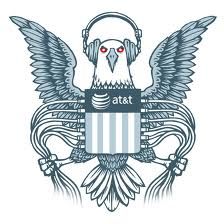It is the first responsibility of every citizen to question authority.
~Benjamin Franklin~
The Guardian revealed that the National Security Agency seized millions of Verizon customers’ phone records through a secret court order. Then Glenn Greenwald and Ewen MacAskill exposed the top secret NSA PRISM program that program taps in to user data of Apple, Google and other US tech companies.
In 2001, Sen. Russ Feingold was the only vote in the Senate against the Patriot Act and warned us about this sort of data collection.
One provision that troubles me a great deal is a provision that permits the government under FISA to compel the production of records from any business regarding any person, if that information is sought in connection with an investigation of terrorism or espionage.
Now we’re not talking here about travel records pertaining to a terrorist suspect, which we all can see can be highly relevant to an investigation of a terrorist plot. FISA already gives the FBI the power to get airline, train, hotel, car rental and other records of a suspect.
But under this bill, the government can compel the disclosure of the personal records of anyone — perhaps someone who worked with, or lived next door to, or went to school with, or sat on an airplane with, or has been seen in the company of, or whose phone number was called by — the target of the investigation.
And under this new provisions all business records can be compelled, including those containing sensitive personal information like medical records from hospitals or doctors, or educational records, or records of what books someone has taken out of the library. This is an enormous expansion of authority, under a law that provides only minimal judicial supervision.
In a statement to the press, he said that he found the NSA report “deeply troubling”:
In 2001, I first voted against the PATRIOT Act because much of it was simply an FBI wish list that included provisions allowing our government to go on fishing expeditions that collect information on virtually anyone.
Today’s report indicates that the government could be using FISA in an indiscriminate way that does not balance our legitimate concerns of national security with the necessity to preserve our fundamental civil rights. This is deeply troubling. I hope today’s news will renew a serious conversation about how to protect the country while ensuring that the rights of law-abiding Americans are not violated.
After the passage the amended FISA in 2008, Sen. Feingold appeared on MSNBC’s The Rachel Maddow Show, discussing the vote that retroactively legalized warrantless wiretapping by the Bush administration.
This is the law that President Obama used to legally collect all the phone records and access the servers of nine US tech companies. It is well past time that it needs to be “fixed.”
American freedom is on the line:
A few months before he was first elected president in 2008, Barack Obama made a calculation that dismayed many of his ardent supporters but which he judged essential to maintain his drive to the White House. By backing President Bush’s bill granting the US government wide new surveillance powers – including legal immunity for telecoms companies which had co-operated with the Bush administration’s post-9/11 programme of wiretapping without warrants – Mr Obama stepped back from an issue that had initially helped to define his candidacy but was now judged to threaten his national security credentials. It was a big call. Even so, it seems unlikely that either supporters or critics, or even Mr Obama himself, ever believed that five years later a re-elected President Obama would oversee an administration that stands accused of routinely snooping into the phone records of millions of Americans.
Yet that is the situation at the heart of the Guardian’s exclusive story this week that America’s immense National Security Agency is doing just this on Mr Obama’s watch. [..]
Few Americans believe that they live in a police state; indeed many would be outraged at the suggestion. Yet the everyday fact that the police have the right to monitor the communications of all its citizens – in secret – is a classic hallmark of a state that fears freedom as well as championing it. Ironically, the Guardian’s revelations were published 69 years to the day since US and British soldiers launched the D-day invasion of Europe. The young Americans who fought their way up the Normandy beaches rightly believed they were helping free the world from a tyranny. They did not think that they were making it safe for their own rulers to take such sweeping powers as these over their descendants.
So much for electing a constitution scholar as president.

 While Congress is stalled on the great fiscal myth negotiations, on thing that both houses are have agreed is unconstitutional, warrantless surveillance. This morning, the
While Congress is stalled on the great fiscal myth negotiations, on thing that both houses are have agreed is unconstitutional, warrantless surveillance. This morning, the  In 2005 while George W. Bush still sat in the Oval Office, James Bamford penned this article for the New York Times Week in Review titled
In 2005 while George W. Bush still sat in the Oval Office, James Bamford penned this article for the New York Times Week in Review titled  Where have all our freedoms gone? Have they eroded before our eyes because we failed to use them by demanding that our elected representatives protect the Constitution? Did irrational fear of an unseen enemy with no country, armed with a fanatical hatred scare us into allowing those freedoms to be abrogated? Apparently our current government from the executive to the judicial seem to think that the Constitution is a nice idea but its time has passed. We’re at war with “terror” and “terror” will never surrender. Law Professor Jonathan Turley, in an op-ed written shortly after President Obama signed the National Defense Authorization Act into law, enumerated the
Where have all our freedoms gone? Have they eroded before our eyes because we failed to use them by demanding that our elected representatives protect the Constitution? Did irrational fear of an unseen enemy with no country, armed with a fanatical hatred scare us into allowing those freedoms to be abrogated? Apparently our current government from the executive to the judicial seem to think that the Constitution is a nice idea but its time has passed. We’re at war with “terror” and “terror” will never surrender. Law Professor Jonathan Turley, in an op-ed written shortly after President Obama signed the National Defense Authorization Act into law, enumerated the
Recent Comments